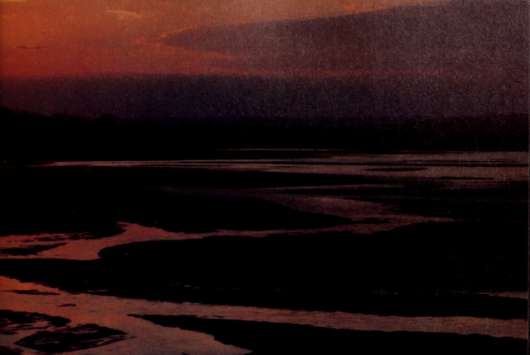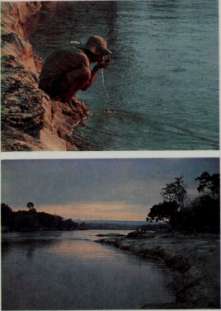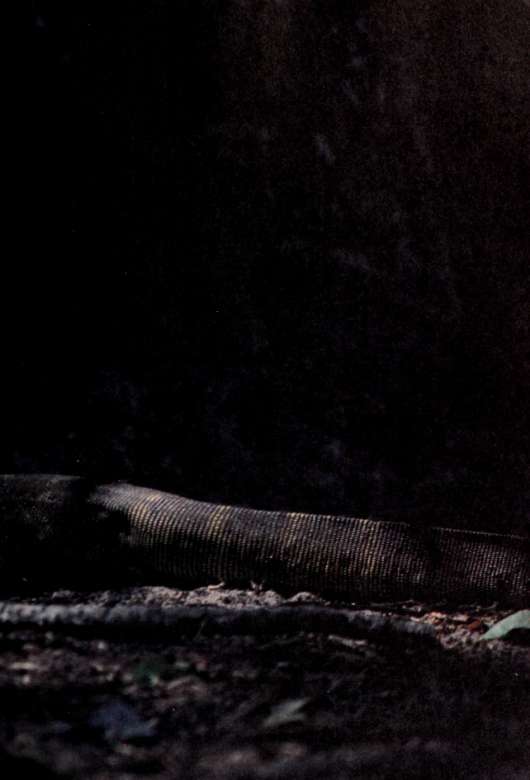Sand rivers (25 page)

Apart from this buffalo and a few small groups of elephant, animals in this long-grass country have been scarce, as if all the waning energy in the coppered hills and yellowed trees and sinking rivers of September had been distilled in the fierce greens of the parrots and the paradisal blues of the brilliant rollers. But on the far side of a rise, in an open hollow, the missing animals have taken shelter from the silent landscape - impala, wildebeest, wart hog, zebra, and elephant, with a flock of the huge batutu in attendance. Led by the hornbills, all but the elephant stream away uphill toward the blue sky, striped horses shining in the high bronze grass.
Goa follows the old paths of the elephants, which follow the ridge lines and avoid the stony depths and thorn of the karongas; it is pleasant to sense that most of these neat trails, two feet across, from which all grass has been worn away, have never been seen or walked by human beings. Eventually a path descends toward the river, and from a bluff we contemplate an elephant with calf, at rest on a clear shoal in the middle of the glittering Mbarangandu; in the new light of the river morning, they seem to dream, lulled to forgetfulness of where they might be going by the clear torrent from the southern mountains that casts sparkling
\165\
PETER MATTHIESSEN
reflections up the gray columns of their legs. We wait. Others have crossed ahead of them, feedmg calmly m rank canebrake by the river, and when the cow and calf move on, we wade out into the sun-filled flow and continue southward.
Before long we are stalled by another elephant, this one a young bull standing in the grass of the river margin. Since more elephants are visible in the dense thickets, Goa leads the file on to the sand bar, passing in front of the elephant, and a bit close. When the bull begins to flap its ears and paw the ground, Brian and Goa, exchanging guns, also exchange an old-days grin of recognition; they have met this situation many times before. Brian says later that they must have killed three hundred elephants together (of the estimated thirteen hundred he has executed in his lifetime), almost all of them on control work in Tanzania; it has been many years since he took one on license. Between one and three thousand elephants were destroyed annually in control operations throughout his twenty-three years in the Game Department, and this was only a fraction of the total number taken here in the southeast.
The bull does not yet have our scent, nor does he see what makes him nervous, although Brian claims that elephants' sight is better than people imagine; perhaps he has heard us, or perhaps what has come to him is some subtle shift in atmosphere that affects his sense of elephant well-being. Testing the air with lifted trunk, he steps down on to the river bed, then swings around to dig a hole under the bank. When the water wells up, he picks up a trunkful and hurls it overhead, so that it falls with a fine splat upon his back; he sprays himself behind his ears and under his belly. In the process he develops an erection, but the lumbering penis is gingerly, first lowering a little like a boom, then bobbing upward in alarm as its owner moves out over hot sand. Wearing the river at a point downwind of us, the elephant stops short, then turns toward us, trunk held high; the gland takes cover as he wheels away and hurries into the bush.
A big pan not far away up the east bank of the river has always been a famous place for elephant and game; in other days, this pan held a large pool that was permanent home to crocodiles and hippos, but the hippos eventually wore their runway to the river so deep that at last the whole marsh emptied out, obliging these two species to gain a living elsewhere. It was here at Likale, Brian says - and he points to an open wooded hill on the south side - that he saw the greatest and most splendid kudu of his life. On the north side, sixteen elephants feed on the green carpet of an mbuga, and a number of others are in sight, including two that cross the river to join those on the western bank. In the dry pan, one hundred buffalo stand in a compact herd, with nearly that number of impala, thirty wart hog, a band of kongoni with a new calf, a zebra herd at the far wood edge where had been seen the great kudu of yore, and a quorum of the elongated birds that stand about at the water's edge the world over.
SAND RIVERS
Brian looks about him, saying, "I feel as if 1 was just here the other day. Nothing seems to have changed very much." I couldn't make out w^hether he was glad or sorry.
Having always been wary of returning to any wild place that has meant a lot to me in case it might have changed, and not for the better, I ask him why he has been so anxious to return to the Selous. At this, he glares at me, defensive. "Who said / was anxious to return here? Tom Arnold tell you that?" When I say nothing, but just meet his gaze, he comes off it with a sheepish smile. "No," he says quietly. "I get a lot of pleasure out of being here. See how the game is doing. Visit the old places. See my old staff." He glances at Goa, then blurts out, "The Selous is home to me, you see; it's the only place on earth where I feel 1 belong." Asked if he wanted to be buried here, as lonidea had been, he answers stiffly, "Don't give it much thought. Doesn't pay to be morbid. Don't expect 1 care very much what they do with me after I'm dead."
We wade the river and make camp just opposite the pan. To the east, the land rises to steep red escarpments; these broad valleys with steep cliffs may well be indications of ancient fault lines of the Great Rift that runs south from the Red Sea to the blue Zaiftbezi. On all sides is an airy view of the Old Africa, and I am delighted that Brian wished to camp here and sorry to see the look of discouragement upon his face. "I'd been looking forward to this place," he says, "and it's the best we've seen, yet it just doesn't compare with the way it was. That buffalo herd used to be three or four times that size! And we have yet to see a single elephant with decent ivory!" It was just about this time last year that he and Arnold had flown up the Mbarangandu on a reconnaissance for this safari, "and there was a lot of game here, a lot of game, and all the way along: I don't believe we were ever out of sight of elephant." I protest that even a poaching epidemic, of which we have found no sign at all, could not have wiped out so many elephants in a single year, and at this he brightens; we should not forget, he reminds me, that the rains were very late this year, while last year they were normal. "We're well into September, and the Mbarangandu still looks as it normally does by late June or early July! The dry season is two months behind schedule, and the animals are still scattered. There's no need for them to concentrate along the rivers. There's water everywhere out in the bush, you've seen it for yourself!" For a moment Brian's voice is elated again, as if this familiar litany has cleared his doubts, yet, as I am beginning to perceive, a part of him has no wish to be consoled, for a moment later he is glum again. "I suppose it's a mistake to revisit a place you loved, to make this sort of sentimental journey. I haven't made a foot safari since 1963 - everything was Land Rovers after that - and a place can change a lot in sixteen years."
I repeat my arguments, to reassure myself as well as him: the scarcity of big bulls with large tusks is bothersome, of course, but it is simply not possible that the thousands of elephants observed from the
PETER MATTHIESSEN
air in 1976 and 1978 could have been killed off by poachers or even by plague, since on this trek we have found not one dead elephant. Also, the fact that the groups were so small was strong evidence that they were not being harassed. And wasn't there also a certain negative reassurance in the case of the rhino? Regularly along our way we have come upon fresh rhino scrapes, and since the rhinoceros regularly returns to the same place to defecate, almost all of these scrapes must represent different animals: yet the pair this morning were the first ones we have actually seen on our safari.
In the 1960s a number of rhino were killed because of a notion among Orientals that the compacted erect hair of the rhino "horn" was a cure for impotence and certain fevers: the accelerated rhino slaughter of today has come about because rich Arabs of the Middle East have made a fashion of daggers with rhino horn handles, for which they are willing to pay over six thousand dollars apiece. The fad or fetish for these phallic daggers has jumped the already very high price of horn up to five thousand dollars per kilo in Hong Kong - the worthless stuff commands more than pure gold - and unless drastic measures are enforced, and soon, an ancient species may vanish from the earth millions of years before its time because of sexual insecurity in Homo sapiens.
Even ten years ago one could take for granted encounters with a few rhinoceros; these days it is a stroke of luck to see one. So far as it is known, black rhinos have been all but eliminated from Uganda. Kenya's recent population of fifteen to twenty thousand rhino has been reduced to between twelve and fifteen hundred. Since the early 1970s, the rhino in the Tsavo parks have declined from seven or eight thousand to one hundred and eighty; in the small Amboseli park, the decline is from fifty to ten. Rhino poaching has crossed the border from the Mara into the Serengeti, and the other important Tanzania parks - Ngorongoro, Man-yafa, Tarangire, Ruaha - have already lost at least three-quarters of their populations. In the Selous the most recent estimate of rhino numbers, made during the air survey of 1976, arrived at the figure of four to five thousand, which must be the last large healthy population of this species in the world.
In the late afternoon, I wade the river to observe the large impala herd, which is mostly engaged in group activity that seems to anticipate the rut; while the does amble back and forth, uninterested, the bucks all run about, tail flags held high and barking like sick baboons, pausing here and there for a quick skirmish, running on. A few elephant and buffalo still linger at the edges of the plain, and the thirty wart hogs are still present, avoiding one another's company, moving about on their front knees and snuffling into the earth.
Dark clouds and wind. At dusk, under the eastern bluffs where an elephant is throwing trunkfuls of fine dust into the air, a ghostly puff of light explodes, another, then another. 1 cannot see the elephant, only the
(Ri^bt) River confluence. \168\



(Over) Water-buck.
.*^ -.^
KtCHf"
S.:S*%**-,
•^^S^^^'Wy^'!
lfrf^*&^.. "^'^
